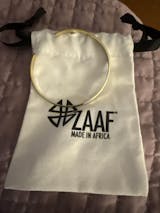When TOMS Shoes burst onto the scene with its One for One program in 2006, it introduced a radical new way of thinking about business. Though the model was far from perfect, its easy-to-understand mission — buy a pair of shoes, help a person in need — paved the way for a new breed of fashion company. The many "social enterprises" that have followed its lead similarly emphasize human and environmental well-being, along with the support of local artisans, rather than merely maximizing profit.
Considering that women in developing countries make up a larger percentage of the world's garment workers — and the world's poor — than men, women of color are often the main beneficiaries of these kinds of businesses. As such, who better to found companies that help them than other women of color? Here, we rounded up six of our favorite ethical fashion brands that exemplify just that dynamic.
1. With heaps of praise from major-league players like Vogue, Kanye West and the CFDA, Aurora James and her label Brother Vellies are perhaps the best-known in this category. But what makes the three-year-old brand truly noteworthy isn't the industry approval it has received — it's the way the luxury label takes the idea of social responsibility to the next level. Working closely with artisans in South Africa, Kenya and Morocco, Brother Vellies is a prime example of what it looks like to elevate and honor indigenous techniques.
"We take inspiration from Africa so much and I just think as creatives we all have the opportunity to raise other people up through our own creative ability," James said during her acceptance speech at the CFDA/Vogue Fashion Fund awards last fall. "I urge [the fashion industry] to really involve Africa in the conversation instead of just taking inspiration from them."
2. Co-founded in 2013 by actress Rosario Dawson and former Bottega Veneta exec Abrima Erwiah, Studio 189 partners with artisans in Ghana to create African and African-inspired clothing. The luxury line boasts a refined bohemian vibe that brings together generations-old techniques like batik, hand-painting and indigo dyeing with modern silhouettes like ultra-wide-leg trousers and crisp, tailored button-up shirts. Besides creating opportunities for artisans to reach a wider audience through collaborations with the likes of Opening Ceremony and Yoox, Studio 189 also offers educational programs in the communities its artisans live in.
3. ZAAF founder Abai Schulze spent the first 11 years of her life in an orphanage in Ethiopia before being adopted by American parents. As an adult, she headed back to the country of her birth, where she founded luxury leather goods company ZAAF in the nation's capital of Addis Ababa. ZAAF's handbags combine the premium leather Ethiopia is known for with textile accents made by local weavers.
"The stunning skills and even the actual looms our weavers use are handed down through countless generations," Schulze explained to Fashionista via email. "ZAAF supports and advances traditional handicrafts industries to cater to the global market without compromising the artisans' national and cultural identity."
4. Bantu Wax founder Yodit Eklund wanted to create a surf brand with a global reach — think Quiksilver, except made sustainably and fairly in Africa. At a time when many swimwear brands are appropriating indigenous textiles and patterns in their designs, Bantu Wax offers customers something that can't be stolen: authenticity. Featuring bright wax prints with local flair, Bantu's swimwear, T-shirts and bespoke surf boards are winning over surf fans in the Western world and Africa alike.
"Bantu Wax is completely multiracial, multicultural," Eklund told the Guardian last year. "Surf brands haven't ever been like that — it's been very blonde hair and blue eyes. Africa is the youngest continent, kids are surfing in and out of the water, surfing the waves, surfing the Internet. Given the amount of coastline, the next Kelly Slater may well be from Africa."
5. LemLem was founded in 2007 by Ethiopian model Liya Kebede in response to the decreasing demand for local weavers' skills in her home country. Featuring wearable, comfy silhouettes in breezy, hand-woven and -crocheted fabrics, the label has found a niche with Western customers through partner stores like Barney's and Shopbop. Besides helping to stimulate the local economy, LemLem also donates a portion of its proceeds to promote maternal health through the Liya Kebede Foundation.
6. Period panties brand Thinx makes underwear that can be worn in lieu of tampons or pads without leaks. Co-founders (and twin sisters) Miki and Radha Agrawals's disruption of the Western feminine hygiene market might be what their brand is best known for, but a lesser-known fact is that Thinx underwear is ethically manufactured in a family-owned factory in Sri Lanka. Not only that, but the brand partners with Uganda-based company AFRIpads to give women in the developing world access to hygiene products they need, too.
"I think based on my heritage (half-Japanese, half-Indian French Canadian), I can empathize a lot with people's differences — making it easier to build a bridge of understanding," Miki said via email. "I visited Uganda earlier this year and talked to some of those women who sew, sell or use the menstrual kits that we fund, and they tell us that their lives have changed. The rate of attendance in school skyrockets when they have access to the materials they need, and the women that AFRIpads employs now have truly sustainable careers."


